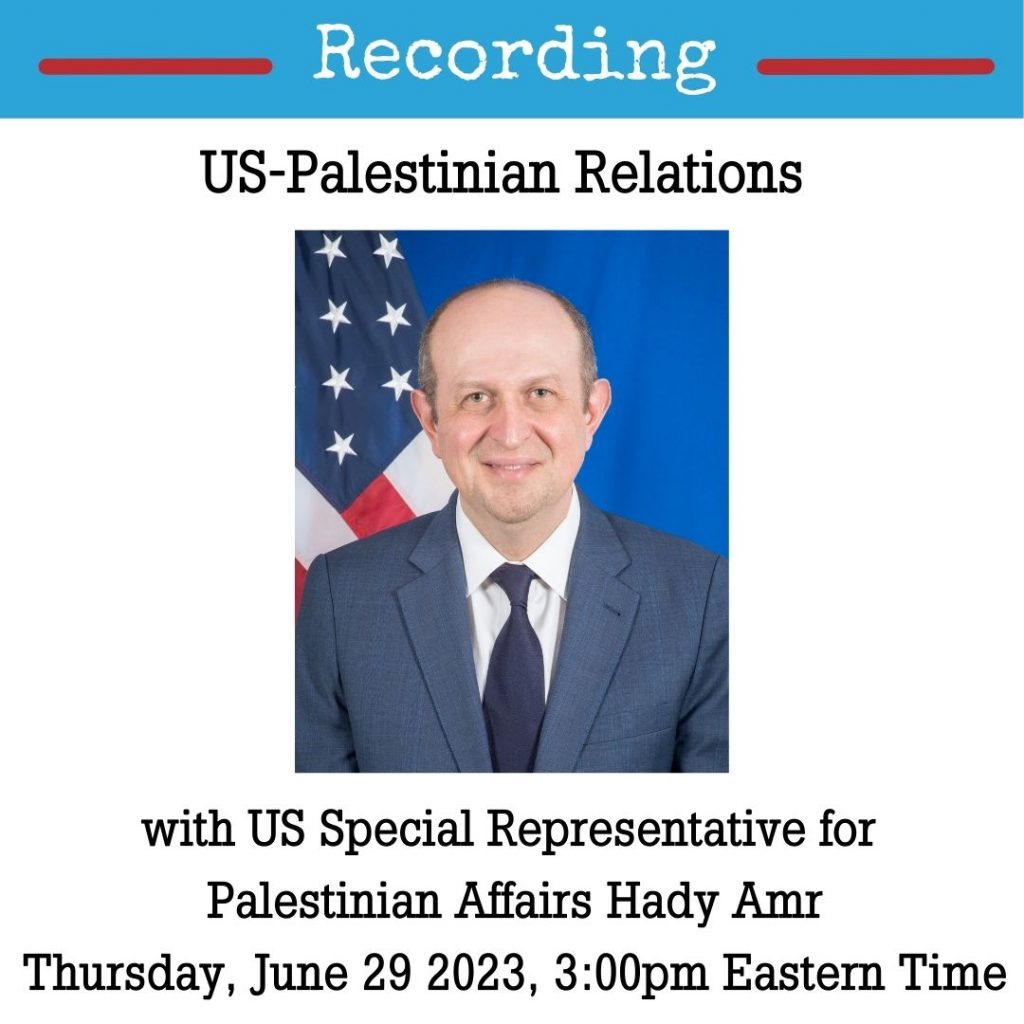Produced by the Foundation for Middle East Peace in cooperation with Americans for Peace Now, where the Legislative Round-Up was conceived.
Marilyn Katz and James Klutznick: Illinois’ ‘anti-boycott’ law hinders protest of Palestinians’ oppression
By Marilyn Katz and James Klutznick
Chicago Tribune
Jun 28, 2023 at 5:00 am
In the early morning hours one day last week, we and many others received an urgent plea for help from a friend in Palestine whose family home was under vicious attack by men with guns and incendiary weapons.
What surprised us was not the cry for help. The last six months have seen a steady increase in violence against Palestinian villages, and Palestinian and Israeli friends alike have shared the news. The surprise was that the request came from a member of the Illinois General Assembly. State Rep. Abdelnasser Rashid was visiting his parents at their family home in Turmus Ayya — an idyllic West Bank village that is home to many families whose younger members are U.S. citizens, including some Illinoisans.
The Rashids’ home, like dozens of others in Turmus Ayya and neighboring villages, was under attack by Israeli “settlers” — a term Israel uses to describe Israelis who, with government funding and in violation of international law, have been given land and resources to build communities in the West Bank. Israel occupies more than 60% of the territory and has had settlements there since 1967.
Americans for Peace Now (APN) welcomes the letter sent today by Rep. Jan Schakowsky (D-IL) and 21 additional members of the House of Representatives urging US Ambassador to the UN Linda Thomas-Greenfield to advocate for the United Nations to adopt its own comprehensive, nuanced, and action-based approach similar to the US National Strategy to Counter Antisemitism.
The National Strategy exemplifies the Biden Administration’s unwavering dedication to fighting this deeply rooted form of hatred, while simultaneously protecting free speech and safeguarding the rights of all individuals. The incorporation of multiple definitions of antisemitism into the strategy is an inclusive and comprehensive approach that recognizes the diverse manifestations of antisemitism and allows for a more tailored response to each unique context. This approach should serve as a model for nations around the world.
We commend Representative Schakowsky and the 21 other signatories for their commitment to combating antisemitism, both domestically and internationally, and echo their call for the Biden Administration to advocate for this model to be implemented globally.
Hadar Susskind, President and CEO of APN said “As the United Nations formulates its own plan to combat antisemitism, this is a crucial opportunity for the United States to advance this pragmatic and nuanced approach to combating antisemitism on a global scale. I am grateful to Congresswoman Schakowsky and her colleagues for their support for a framework that protects speech rather than a definition that weaponizes antisemitism to quash legitimate criticism of Israeli government policies and practices.”
Yossi Alpher is an independent security analyst. He is the former director of the Jaffee Center for Strategic Studies at Tel Aviv University, a former senior official with the Mossad, and a former IDF intelligence officer. Views and positions expressed here are those of the writer, and do not necessarily represent APN's views and policy positions.
Produced by the Foundation for Middle East Peace in cooperation with Americans for Peace Now, where the Legislative Round-Up was conceived.
1.Bills, Resolutions
& Letters
2.
FY24 Approps & NDAA
3. Hearings & Events
4. Media &
Reports
5. Members
on the Record (Israel/Palestine)
6. Members on the Record
(Iran)
7. Members
on the Record (other Mideast countries)
A Dangerous Shift Is Underway in the West Bank
Mr. Nir is a former West Bank correspondent of Israel’s Haaretz newspaper.
At her funeral, settler leaders called for revenge. One scrawny settler, sitting on a big rock a few yards behind where I stood, repeatedly chanted, “Geirush! Geirush!” (Expulsion!) in a heavy American accent. Later, after the crowd dispersed, the settler told me he had recently emigrated from New York and that his dream was removing the Arabs from the Promised Land.
His chant has been resounding in my ears as I’ve followed the latest cycle of violence in the West Bank.
Last week, two Palestinian terrorists killed four Israelis and injured four others near the Eli settlement, escalating monthslong violence between Palestinians and Israelis in the West Bank. The next day, some 400 settlers descended on several Palestinian villages, including Turmus Aya, a prosperous town near Ramallah, where reportedly they torched cars and homes. The attack follows others this year, which as The Times noted in February, has marked “one of the most intense episodes of settler-led violence in memory.” Since January, there have been more than 440 settler attacks on Palestinians in the West Bank.
It is not hard to see how we arrived here.
In the last quarter century, the intersection of ever-expansive building projects in the occupied territories and greater permissiveness over settler violence has created a toxic brew of leniency and lack of accountability. In the process, more and more Israelis have accepted the view that areas in the West Bank inhabited by Jewish settlers have become a part of sovereign Israel.
Yet even as the occupied territories have grown ever more occupied since the early 1990s, the idea of clearing the land of Palestinians was seen by all Israelis, including the settlers, to be about as attainable as the Messiah arriving on his white donkey. For many years, the ultranationalist settlers’ strategy was mostly focused on avenging Palestinian terrorism and maintaining their illegal outposts — proto-settlements built without government approval and in violation of Israeli law. Extremist settlers’ attacks on Palestinians were a way to hold on to those outposts; they helped to dissuade Israeli officials, who wanted to avoid an escalation of violence between the two groups, from following through on any attempts to dismantle the unlawful settlements.
Several times after the 1993 signing of the Oslo Accords, when an Israeli-Palestinian agreement seemed within reach, I asked ultranationalist settler leaders what their alternative vision was to a two-state solution or some other compromise agreement with the Palestinians. More than once, the reply was, “This is the land of miracles. We are praying for a miracle.” I took that “miracle” to mean that through divine intervention, Israel would be able to annex the land of the West Bank without its Palestinian residents.
At the time, such an aspiration could not be articulated or voiced due to the political climate, so these extremist leaders resorted to euphemism. But in the past few years, Israeli politicians, have spoken openly about their desire to annex most of the West Bank, including, at one time, Naftali Bennett before he became prime minister. Today, with a government that appears far more aligned with them, the extremist settlers seem to think that the white donkey is in sight.
The far-right Israeli cabinet minister Bezalel Smotrich, who has been a settler activist himself, is now the de facto minister of the West Bank. The new Israeli government has declared its commitment to a policy that strives to boost Israeli presence and diminish the Palestinian footprint in Area C. The area is envisioned under the Oslo Accords to be gradually handed over to the Palestinian Authority but remains under Israeli control. It covers 60 percent of the West Bank, and includes all of the Jewish settlements. The current government has just issued a new policy that will speed up the approval process for settlement construction and advanced plans for building more than 4,000 new settlements units there.
The Biden administration has issued welcome condemnations of settler violence and of Israel’s failure to confront it, as well as of the Israeli government’s settlement expansion policy. But judging by these public announcements, it may be missing the full importance of this dangerous shift in both the motivation behind the attacks and the government’s position. Washington is reacting to settler violence mainly as a failure of the Israeli authorities to enforce the law on violent settlers, and to settlement policies as an impediment to a future peace agreement. Both are correct, but they do not address the prospect of these policies and practices to drive out West Bank Palestinians.
Already, in May, the entire population of Ein Samiya, a tiny Palestinian community of about 200 people northeast of Ramallah, packed up their modest belongings and fled their homes following unrelenting attacks by neighboring settlers. “We decided to leave out of fear of the settlers,” Khader, a father of nine, told Haaretz’s Hagar Shezaf. “I left for my children. My youngest said to me, ‘I don’t want to live here — the settlers come and throw stones. Tomorrow they could kill me.’”
But even as the settlers terrorize their Palestinian neighbors with increasing frequency and ferocity, their actions have come with little consequence; Israeli authorities seldom prosecute or convict them. In some recent attacks, Israeli military and police officers have even been documented standing idly by as settlers stormed and burned Palestinian villages.
This is a striking departure from the promises Israel made as settlers burned and destroyed buildings in several Palestinian villages in February. In the Aqaba agreement, the result of a summit in Jordan convened by the U.S., Egypt and Jordan that brought the Palestinians and Israelis together for talks for the first time in over 10 years, both sides “reaffirmed the necessity of committing to de-escalation on the ground and to prevent further violence.”
Building one thousand new homes for settlers is unlikely to de-escalate anything. The Biden administration and Israel’s Arab neighbors should not allow the Israeli government to go back on its word to contain violence enacted by its own citizens. Thirty-five years after Ms. Porat’s death, the vigilante justice crudely advocated by the settler at her funeral is becoming dangerously normalized.
Ori Nir, the vice president of public affairs for Americans for Peace Now, was the West Bank correspondent of Israel’s Haaretz newspaper between 1986 and 1990, and between 1994 and 1996.
This article was published in the New York Times on June 26th 2023 https://www.nytimes.com/2023/06/26/opinion/international-world/west-bank-israel-palestine.html
Americans for Peace Now (APN) welcomes the announcement made by the Biden administration concerning the issuance of guidance aimed at restricting scientific and technological cooperation with Israeli institutions beyond the Green Line. This significant step represents a crucial reversal of one of the detrimental policies inherited from the Trump administration concerning Israel and Palestine.

On Thursday, June 29, we held a webinar with Special Representative for Palestinian Affairs Hady Amr. He discussed the U.S. relationship with the Palestinian people and Palestinian Authority, and examined current challenges to the situation on the ground.
Watch the video recording HERE.
Read the transcript HERE.
Listen to the audio on PeaceCast.
Americans for Peace Now urges the Biden administration to react with concrete steps to the Israeli government’s
plan to double the size of the West Bank settlement of Eli and to the government’s failure to prevent settlers’
pogroms against Palestinians.
Yesterday, two Palestinian terrorists shot dead four Israelis and injured four others near the West Bank settlement of Eli. The gunmen were killed by the IDF. APN strongly condemned the attack.
Hours after the attack, hundreds of armed settlers descended on some dozen Palestinian villages in the vicinity of Eli, torched homes, vehicles and fields, vandalized property, and attacked Palestinians. A Palestinian man was shot dead by an Israeli police officer in the village of Turmus Ayya following settlers’ violent attack.
According to eyewitness reports and video clips, IDF troops were present at or nearby the sites of these pogroms, and did nothing. According to press reports, none of the perpetrators has been arrested. As happened time after time in such circumstances, Israel’s occupation authorities in the West Bank fail to prevent, deter or punish settler violence.


